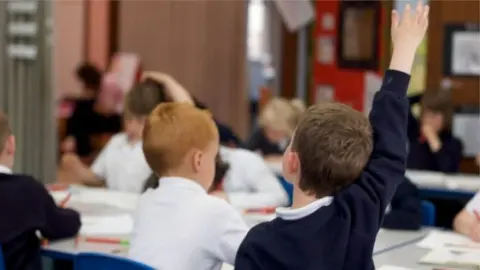Autism: Highest rate on record of NI children with diagnosis
 BBC
BBCOne in 20 schoolchildren in Northern Ireland has a diagnosis of autism, according to figures published by the Department of Health (DoH)
It is the highest prevalence rate on record, and more than four times as many as 15 years ago.
The department cautioned against comparing years due to changes in the way data has been collected since 2019.
It said there were 15,212 children aged 4-16 identified with autism in 2022/23.
That is compared to 14,019 children in 2021/22.
In 2008/09 about 3,300 children had a diagnosis of autism, about 1.2% of the school age population.
The department said the Autism Act 2011 and an accompanying increase in awareness could be partly responsible for the rise.
A further bill to strengthen support services for young people and adults with autism in Northern Ireland was passed by the Stormont Assembly in 2022.
But some of the actions as a result of that have stalled in the absence of an executive.
More common amongst boys
According to the DoH's definition, autism is a developmental disability which influences how a person communicates with and relates to other people and how they make sense of the world.
It is a "spectrum condition" as it affects people in different ways and to varying degrees.
Asperger's syndrome is a similar condition, but children diagnosed with it can have some different language and learning disabilities.
According to the DoH figures, school-age boys were almost three times more likely to have a diagnosis of autism than girls.
Research has suggested that it takes on average six years longer to diagnose autism in women and girls than in males.
About four in five of children with autism have some form of special educational needs (SEN) and more than half have a statement.
A statement is a legal document setting out the child's needs and how these should be met in school by the Education Authority (EA).
Some parents have previously spoken to BBC News NI about the "fight" they have faced to get support for their children in school.
Autism levels among children are higher in deprived areas of Northern Ireland.
'Schools have to start changing'
Dr Gillian O'Hagan, the senior teacher for learning support in Aquinas School in Belfast, and an associate lecturer at St Mary's University College and Queen's University in Belfast said the provision for services for children with autism had not kept up with the increase in prevalence.
"Schools are getting really quite adept at picking up where there is neurodiversity in their classrooms," she told BBC News NI.
"They're getting good at referring but it's after that point at which everything falls down.
"We're still running where children who require a statement aren't getting a statement, even within the proposed turnaround time.
"There is an acknowledgement that autistic children and any other neurodivergent students are an accepted part of our classrooms now, and it should be a celebrated part of our classrooms.
"Schools have to start changing their provision internally and becoming more inclusive."

In a statement, Autism NI's chief executive Kerry Boyd said the DoH figures were significant and showed how important the new Autism Amendment Act was.
"Our autistic people and their families cannot wait any longer for help and support," she said.
"Stormont needs to be up and running fully to enable this to happen."
"The consequences of not progressing with this legislation will undoubtedly have ramifications for years to come."
An separate review of whether support for children with all special educational needs (SEN) in Northern Ireland is "fit for purpose" is almost completed.
It is expected to be published soon and follows a number of critical reports into failings in the EA's support for some pupils with SEN.
